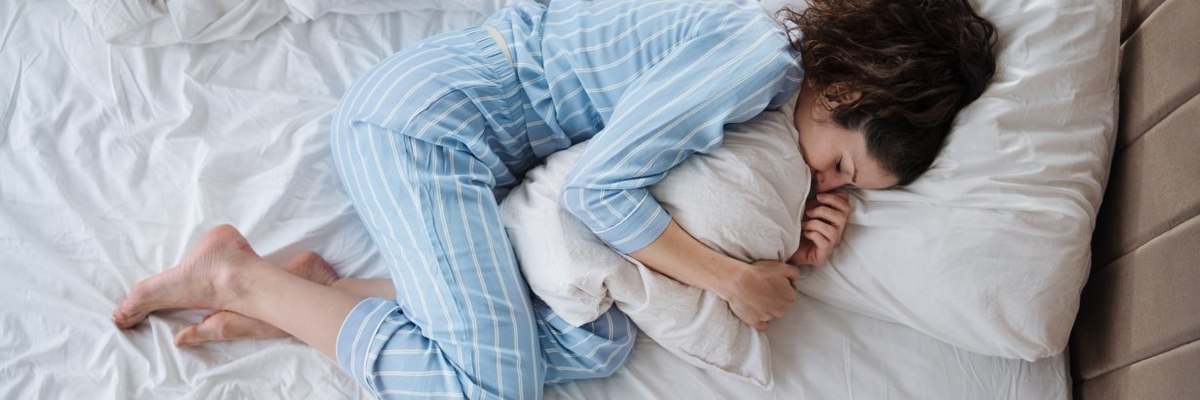This part of the Sleep Study analysed the habits and behaviours of Britons around sleep. It covers issues such as snoring, what Britons wear while sleeping, whether they sleep with someone or alone, and problems sleeping in a strange bed.
Do Britons snore?
Most Britons believe they snore at least occasionally: one in five (19%) report they often snore when sleeping, while around half (45%) do it sometimes.
Men are more likely than women to say they snore often (23% vs 15%).
A quarter of Britons (24%) say they never snore. This applies to one in five men (20%) and around three in ten (28%) women.
The younger Britons are, the more likely they are to think they don’t snore: 43% among 16-24-year-olds compared to 13% of over-60s.
What do Britons sleep in?
Around half of Britons (47%) sleep in pyjamas, with one in five (21%) sleeping in their pyjamas and underwear, and a quarter (26%) sleeping just in their PJs, without any underwear.
A further one in five (20%) sleep just in their underwear and nothing else, with men (32%) being significantly more likely than women (9%) to do this.
One in five Britons (20%) sleep naked, with this being the case for a quarter of men (25%) and one in seven (15%) women. Results show that, across all age and gender groups, sleeping without any clothes on is mostly popular among men older than 40 (30-32%).
When it comes to pillow preferences, four in ten (39%) sleep with one pillow, half (50%) have two and 8% have three pillows or more.
When the weather is warm, 68% of Britons often sleep with the window open. One in five (19%) do so on an irregular basis, while 12% never sleep with the window open when it is warm.
Sleeping alone or with someone, and sleeping in somebody else’s bed
When it comes to sleep quality, more Britons say they sleep better when alone in bed (37%) than with someone else (19%). For a third (33%), it makes no difference.
Women (41%) are more likely than men (33%) to say they sleep better alone.
Eight in ten Britons in a relationship (79%) sleep in the same bed with their partner, while one in five (18%) don’t. Among Britons aged 60 and above, more than one in four (27%) do not sleep in the same bed as their partner.
Our results also show that half of Britons who have pets let them sleep in the same bed with them, including 29% who allow this often and 20% who allow it sometimes. Female pet owners (35%) are more likely than their male counterparts (23%) to say they often allow their pets to sleep in their bed with them.
Around half of British pet owners (47%) say they do not allow their pets to sleep in the same bed with them.
Over four in ten Britons (44%) say it’s difficult for them to fall asleep in a bed that isn’t their own. This is the case for over half of women (54%), compared to a third (34%) of men. For around half (47%) sleeping in a bed which isn’t theirs is not a problem.
Over half of Britons who struggle to fall asleep say it’s difficult to sleep in a bed which isn’t their own (55%). This is the case for a third (33%) of those who don’t report having problems falling asleep.
Sleeping positions and practices
Half of Britons (50%) usually sleep on their side – 27% on their right-hand side and 23% on their left-hand side. Just 7% sleep on their back and 8% sleep on their front.
A third of Britons (32%) say their sleeping positions vary.
Science is divided over whether rocking yourself to sleep could be diagnosed as a sleep-related Rhythmic Movement Disorder (RMD), with other studies claiming that it in fact improves sleep and memory.
Our study finds that just 3% of Britons say they rock themselves to sleep. This rises to 15% of those with diagnosed sleep problems.
How often do Britons wake up at night?
Six in ten (58%) Britons say they often wake up during the night without being prompted by a noise or anything else. While 17% do this very often, four in ten (41%) do this fairly often. Women (64%) are more likely than men (51%) to say this often happens to them.
For 36% waking up at night happens less often.
The older Britons are, the more likely they are to report waking up during the night: 32% of 16-24-year-olds compared to 69% of those aged 60 and older.
Four in ten Britons (40%) say they have often experienced the sensation of falling asleep and then waking up with a start. A further third (34%) say this happened to them once or twice.
Women (83%) are significantly more likely than men (66%) to say they have had this experience.
A fifth of Britons (19%) say they have never felt this sensation, with men being twice as likely as women to have not experienced this (26% vs 13%).
See full results here









